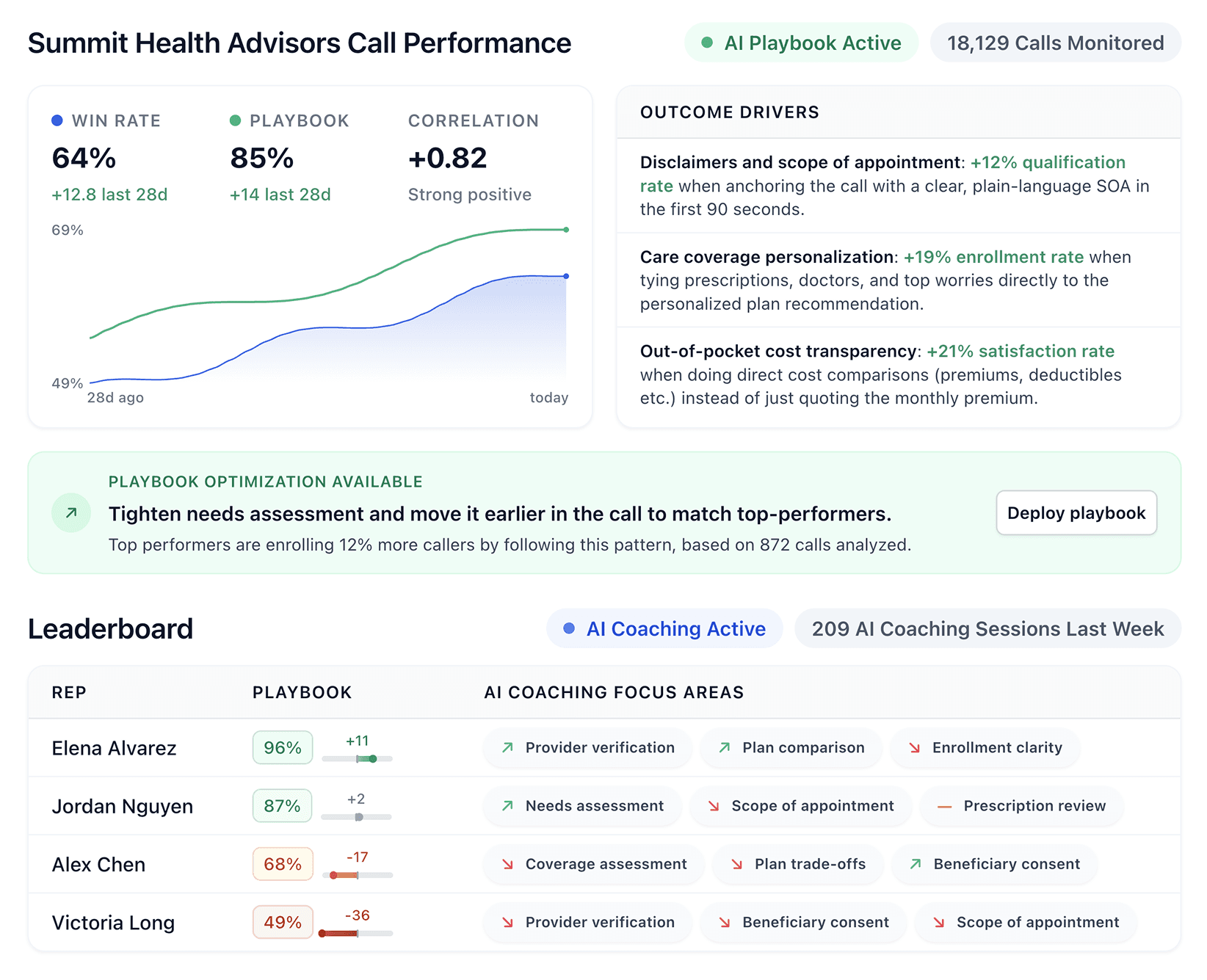
Written by
Zoë

Reviewed by
Paul Dornier
Published on
Nov 3, 2025
We’ve tested dozens of platforms to find which ones actually move the needle for inside sales teams. This guide breaks down the 20 best inside sales software tools available in 2026.
Our 10 favorites out of the top 20 best inside sales software
Tool | Best for | Starting price | Key strength |
|---|---|---|---|
Alpharun | Large inside sales teams (50+) in insurance, Medicare, finance, and home improvement | Custom pricing | Real-time call coaching with AI voice agents for compliance and consistency |
Apollo.io | Small to mid-size teams needing affordable data and automation | $49/user/month (Free plan available) | Contact data and outreach tools at accessible prices |
Weflow | Salesforce users who want faster updates and clean data | $20/user/month | Streamlines Salesforce workflows with intuitive pipeline views |
Salesforce Sales Cloud | Large enterprises with complex sales operations | $25/user/month | Deep customization and a massive integration ecosystem |
HubSpot Sales Hub | Growing companies who need sales-marketing alignment | $100/seat/month | All-in-one platform with quick setup and easy adoption |
ZoomInfo Sales OS | Teams prospecting into new accounts | Custom pricing | Verified B2B data with 65M direct dials and buyer intent signals |
Outreach | Teams with complex pipelines and automation needs | Custom pricing | AI-guided sales execution with automated sequences |
Salesloft | High-volume, multi-touch prospecting teams | Custom pricing | Structured outreach campaigns across multiple channels |
Close | Small to mid-size outbound calling teams | Starts at $40/seat/month | Fast customer relationship management (CRM) with built-in dialer and communication tools |
LeadSquared | High lead volume teams needing workflow automation | $60/user/month | Automates lead capture, distribution, and multi-channel follow-ups |
1. Alpharun
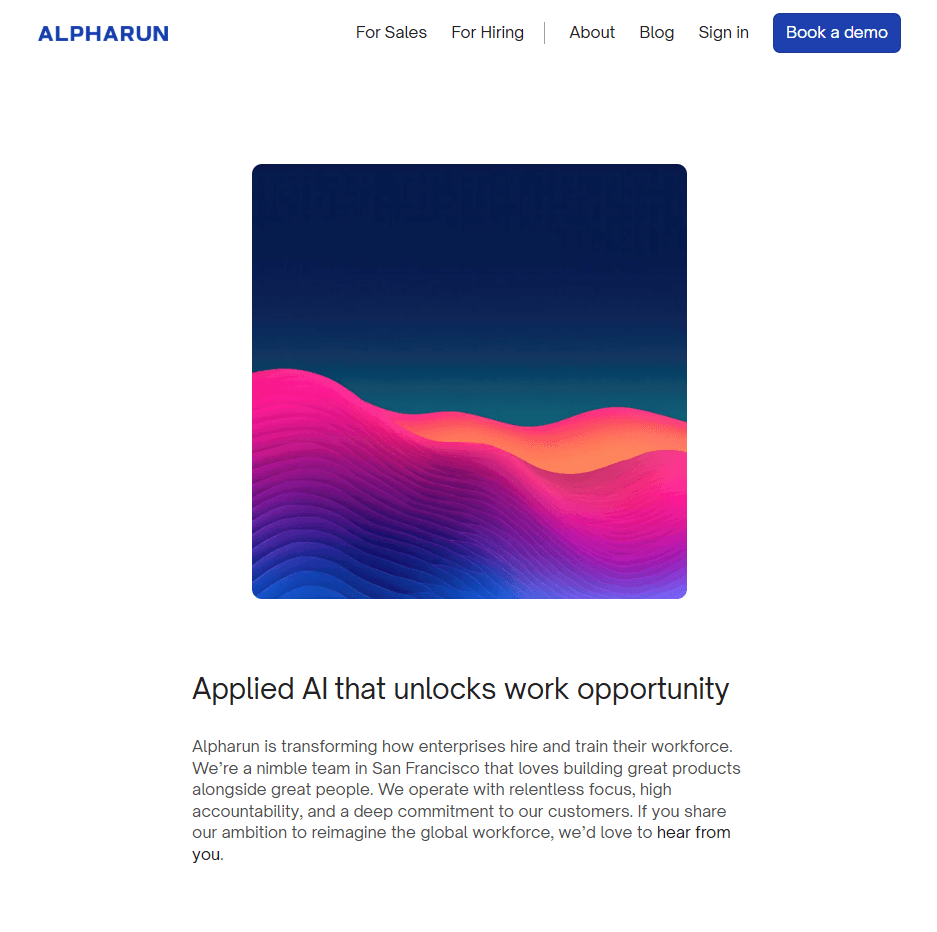
What it does: Alpharun analyzes sales calls, builds a custom playbook, and coaches reps in real time. It also uses AI voice agents to handle routine tasks and keep every conversation consistent and compliant.
Who it is for: Alpharun is built for inside sales teams of 50 or more in industries like insurance, Medicare, finance, and home improvement. It’s for teams that need reliable, compliant performance management at scale.
When a rep starts a call, Alpharun listens and delivers clear, real-time coaching. It flags missed questions, suggests stronger phrasing, and keeps the conversation on track.
After each call, Alpharun summarizes what happened and highlights where reps can improve. Managers can see every insight in one dashboard to track progress and guide training. These features help you build custom call center agent scorecards.
AI voice agents handle routine tasks like lead qualification, scheduling, and after-hours follow-ups. They follow your playbook to keep every conversation consistent and compliant.
It gives sales teams a simple way to learn from their best calls, coach with accuracy, and improve every day.
Pros
Integrates smoothly with major dialers and inside sales CRMs like Five9 and Genesys
Automatically updates playbooks as markets, offers, or compliance rules change
Strong data security with HIPAA and SOC 2 Type II compliance
Custom coaching that adapts to your team’s real calls
Cons
Works best for larger teams with steady call volume
Needs enough call data to build a reliable playbook
Pricing
Custom pricing based on team size and call volume.
2. Apollo.io
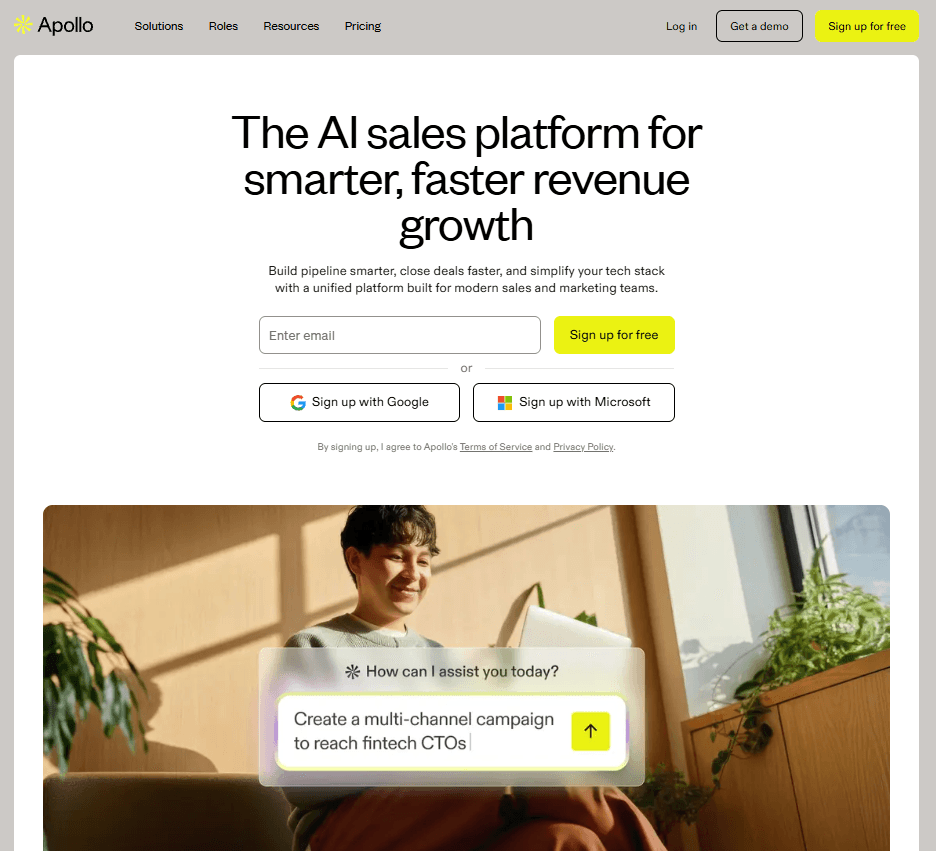
What it does: Apollo combines contact data and outreach tools at affordable prices, making prospecting easier for growing teams.
Who it’s for: Small to mid-size teams that need data enrichment and simple automation without enterprise costs.
Apollo.io blends prospecting data with simple automation at an accessible price. It enriches lead data, automates follow-ups, and pulls verified contact info directly from LinkedIn via its Chrome extension.
It’s perfect for smaller teams that need solid data and straightforward outreach tools without enterprise complexity.
Pros
Great value for data and engagement features
Free plan available for testing
Integrates with CRMs and LinkedIn
Cons
Lower contact volume on free and basic plans
Limited analytics and automation depth
Some inconsistencies in contact accuracy
Pricing
Apollo pricing starts at $49 per user per month, billed annually. A free plan is available. Paid plans go up to $119 per user per month.
3. Weflow
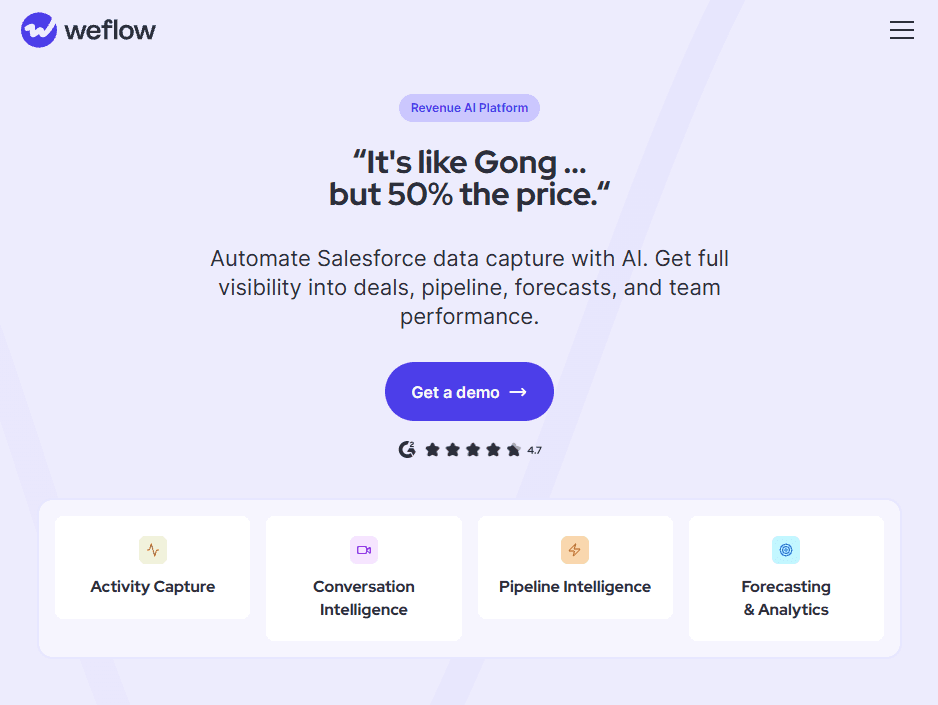
What it does: Weflow streamlines Salesforce updates, improves data accuracy, and helps reps follow your sales process with less effort. It adds intuitive pipeline views, templates, and reminders directly on top of Salesforce, making it faster for reps to log activities, update deals, and stay organized.
Who it’s for: Ideal for inside sales teams using Salesforce who want to improve efficiency, keep data clean, and gain better pipeline visibility through integrated sales representative tools.
Weflow is a sales productivity tool that makes Salesforce easier to use. It helps teams update pipelines faster, keep data accurate, and stay organized with simple workflows, templates, and collaboration features built right into Salesforce.
Pros
Speeds up Salesforce updates and activity logging
Customizable pipeline views simplify daily workflows
Templates and reminders help reps stay consistent
Cons
Only works with Salesforce environments
Custom setup may require admin input
Limited offline access
Pricing
Plans start at $20 per user per month for Activity Capture. Advanced tools like Conversation Intelligence, Pipeline Intelligence, and Forecasting & Analytics each cost $30 per user per month, billed annually.
4. Salesforce Sales Cloud
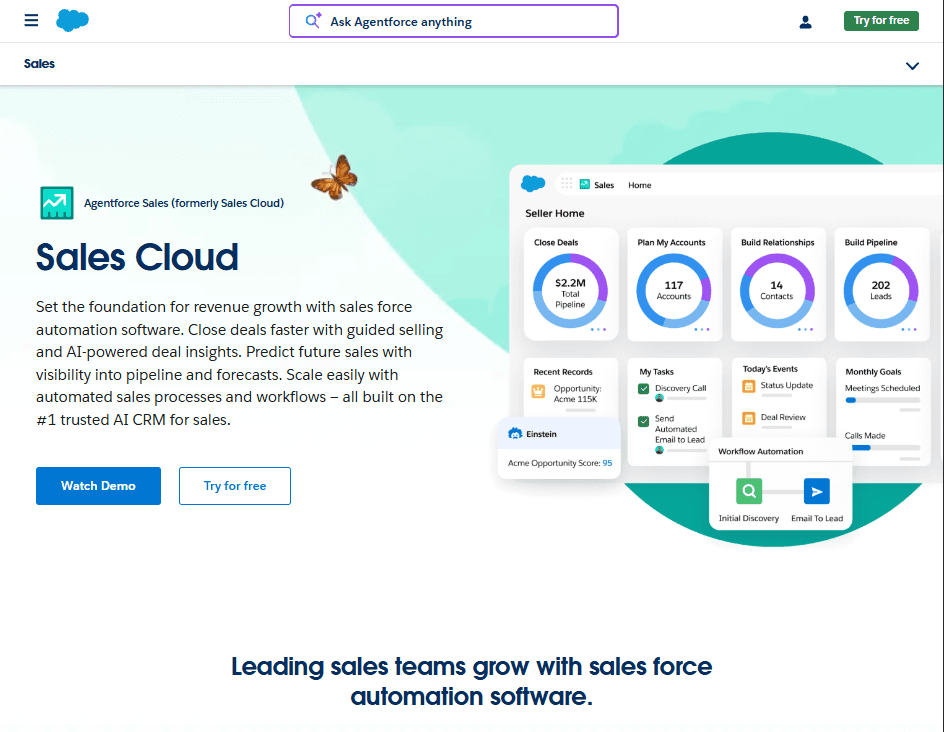
What it does: Salesforce offers a powerful CRM with deep customization options for complex sales operations. Teams can automate workflows, manage pipelines, and connect with nearly any sales tool through AppExchange.
Who it’s for: Built for large enterprises with dedicated admins who need flexibility to design custom sales processes from the ground up.
Salesforce Sales Cloud is an enterprise-grade CRM built to help sales teams sell faster and smarter. It centralizes customer data, automates workflows, and gives managers real-time visibility into pipelines. AI-powered forecasting and detailed reporting make it easy to track revenue and performance.
Add-ons like CPQ management and sales engagement make Salesforce even more powerful, while its massive integration ecosystem connects with nearly every tool in your tech stack.
Pros
Powerful reporting and analytics tools
Robust automation and integration ecosystem
Reliable, enterprise-grade infrastructure
Cons
Steep learning curve for new users
Requires ongoing admin support
Interface that can feel slow and cluttered for daily users
Pricing
Plans start at $25/user/month (Essentials) and go up to $300/user/month (Unlimited). The Enterprise plan at $150/user/month suits most inside sales teams.
5. HubSpot Sales Hub
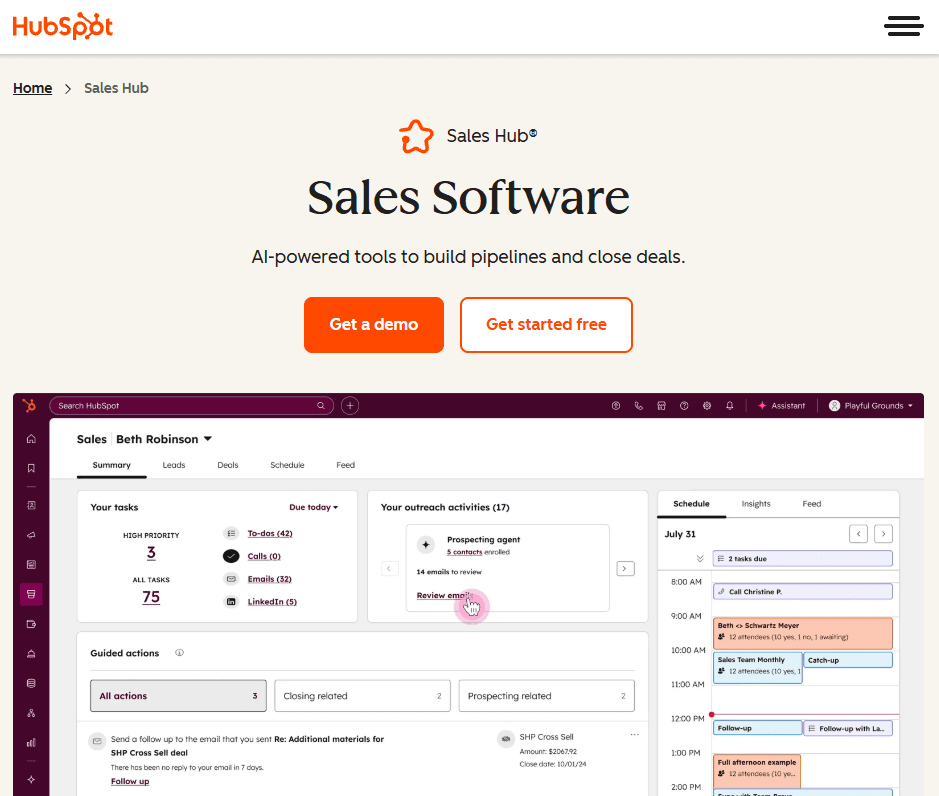
What it does: HubSpot unites CRM, sales engagement, and marketing tools in one platform designed for simplicity and adoption.
Who it’s for: Ideal for growing companies that want sales and marketing alignment without complex setup or IT overhead.
HubSpot Sales Hub is an all-in-one inside sales CRM software that brings together CRM, automation, and marketing tools in one simple platform. It’s designed for quick setup, making it ideal for growing teams that need to connect sales and marketing without relying on IT.
Core tools include a deal pipeline, meeting scheduler, live chat, and reporting dashboard. Higher plans add workflow automation, advanced reporting, and predictive lead scoring.
Pros
Quick setup and easy onboarding
Clean, intuitive interface
Built-in tools for email, meetings, and automation
Cons
Limited customization for complex processes
Advanced analytics locked behind higher-tier plans
Less powerful reporting than enterprise CRMs
Pricing
Sales Hub Professional costs $100 per seat each month. Sales Hub Enterprise starts at $150 per seat each month.
6. ZoomInfo Sales OS
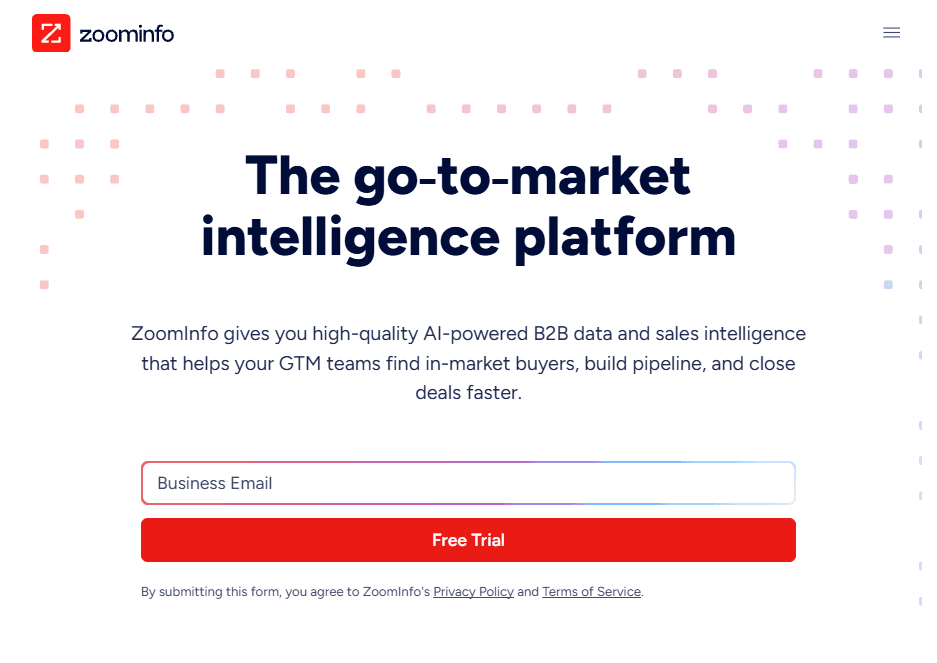
What it does: ZoomInfo delivers verified B2B contact data and buyer intent signals to help reps find and prioritize the right leads.
Who it’s for: Perfect for teams prospecting into new accounts that need accurate, up-to-date contact information.
ZoomInfo Sales OS is a data intelligence platform that gives teams access to verified contact and company information. It has a large database with millions of direct dials and emails. This resource helps sales reps find accurate leads quickly.
Intent data and lead scoring show which accounts are most likely to buy, helping teams focus on high-value prospects.
Pros
Industry-leading data accuracy and coverage
Intent signals reveal which accounts are in-market
Data enrichment fills CRM gaps automatically
Cons
Expensive for small or mid-size teams
May include more data than needed
Some features require training to use effectively
Pricing
Pricing isn’t listed publicly. Reach out to ZoomInfo Sales to learn more.
7. Outreach
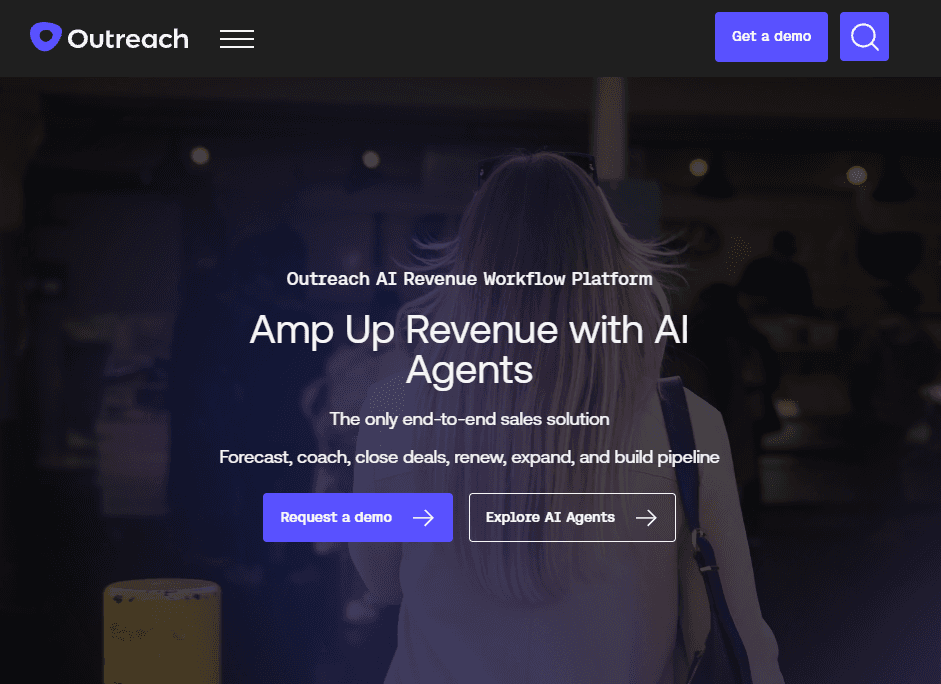
What it does: Outreach automates sales tasks, follow-ups, and communication sequences. It uses AI to guide reps through each stage of the sales cycle and helps managers track activity, performance, and forecast accuracy.
Who it’s for: Designed for inside sales teams. These teams manage complex pipelines. They want to automate daily outreach and keep every deal organized.
Outreach is a sales execution platform that combines automation, AI insights, and workflow management to help sales teams close deals more efficiently.
It provides tools for managing communication sequences, forecasting pipeline outcomes, and guiding reps through every stage of the sales process.
Pros
Automates follow-ups and task reminders
AI suggests next actions to close deals faster
Forecasting and reporting improve pipeline visibility
Cons
Setup takes time to configure
May feel advanced for smaller teams
Requires CRM integration for best results
Pricing
Custom pricing based on team size and feature needs. Contact Outreach for a quote.
8. Salesloft
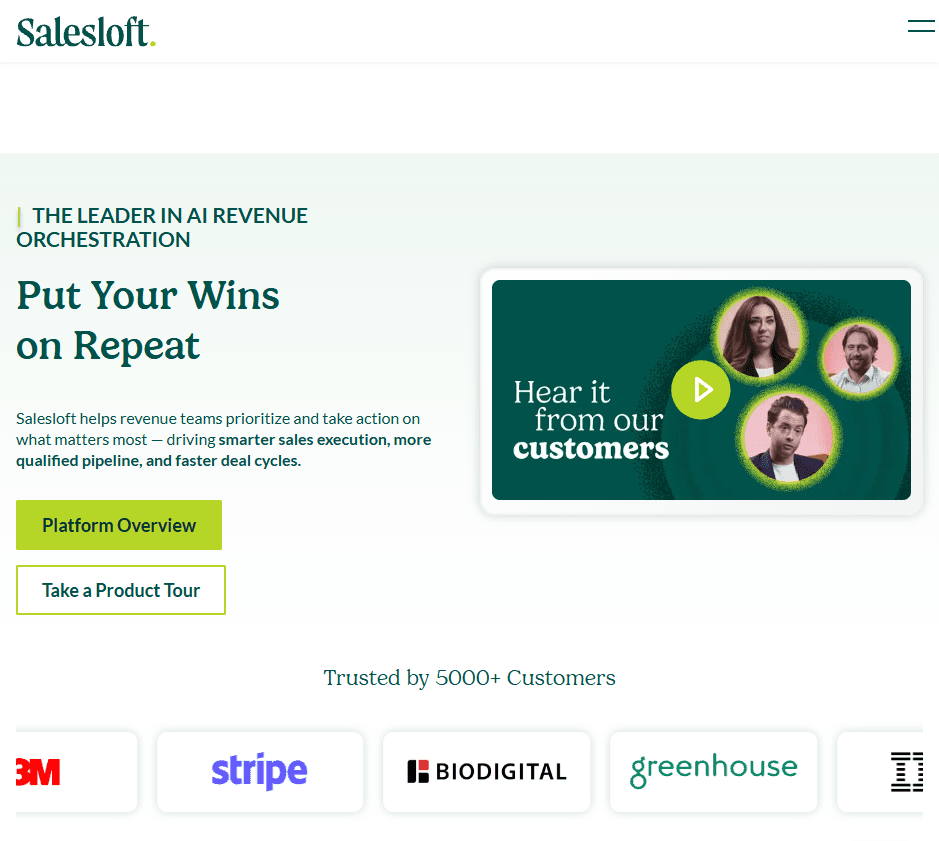
What it does: Salesloft helps reps run structured outreach campaigns across email, phone, and social media from one platform.
Who it’s for: Designed for inside sales teams managing multi-touch, high-volume prospecting.
Salesloft is a sales engagement platform that helps revenue teams execute, track, and optimize their outreach across email, phone, and social channels.
The company focuses on making sales communication more consistent and measurable, giving managers clear visibility into rep activity, performance, and pipeline health.
Pros
Automates manual outreach with proven cadences
Analytics reveal which tactics drive responses
Built-in dialer and CRM sync simplifies workflows
Cons
Cadences require consistent maintenance
Can feel rigid for relationship-driven sales
Focuses more on activity metrics than deal outcomes
Pricing
Custom pricing available by request for Advanced and Elite plans.
9. Close
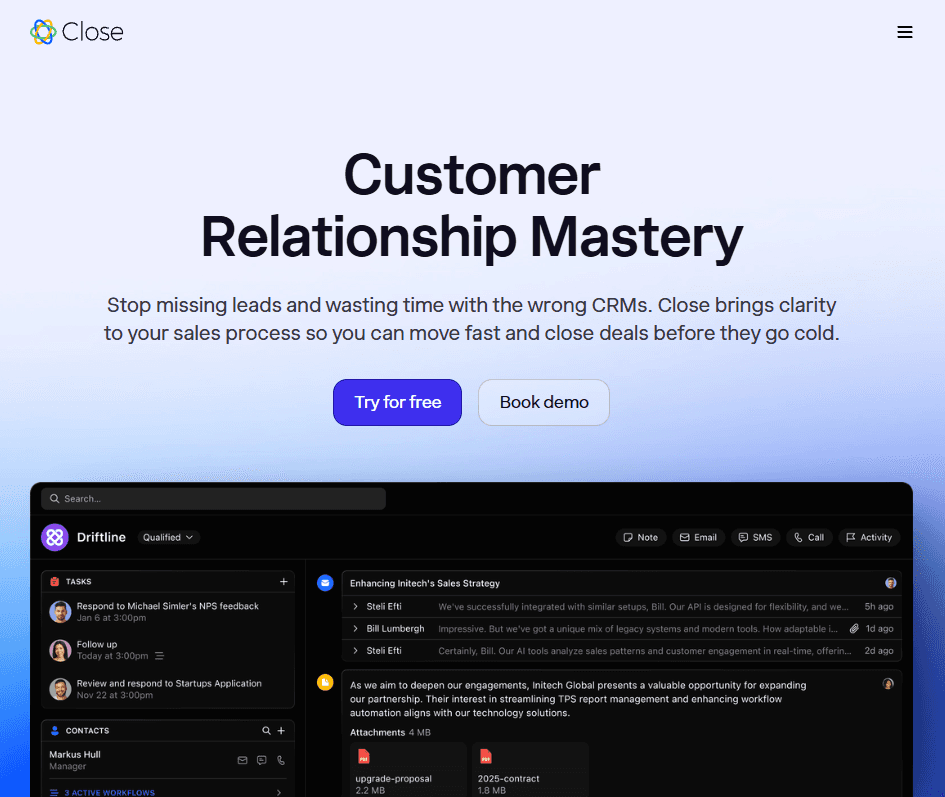
What it does: Close combines CRM, calling, email, and SMS tools in one simple interface built for speed.
Who it’s for: Small to mid-size inside sales teams focused on outbound calling and fast execution.
Close is a fast, streamlined CRM with built-in calling, emailing, and SMS. It’s perfect for inside and outbound teams that live on the phone. Everything sits in one interface, helping reps move faster without juggling multiple tools.
Features include a power dialer, call recording, automation sequences, and detailed activity reporting. It also integrates easily with other tools in your stack.
Pros
Built-in dialer and communication tools
Quick setup with no extra integrations
Affordable pricing for smaller teams
Cons
Limited customization for complex teams
Basic analytics compared to enterprise CRMs
Fewer integrations and advanced coaching tools
Pricing
Close offers three plans starting at $49 per seat per month for small teams. The most advanced plan costs $149 per seat per month and includes features for scaling organizations.
10. LeadSquared
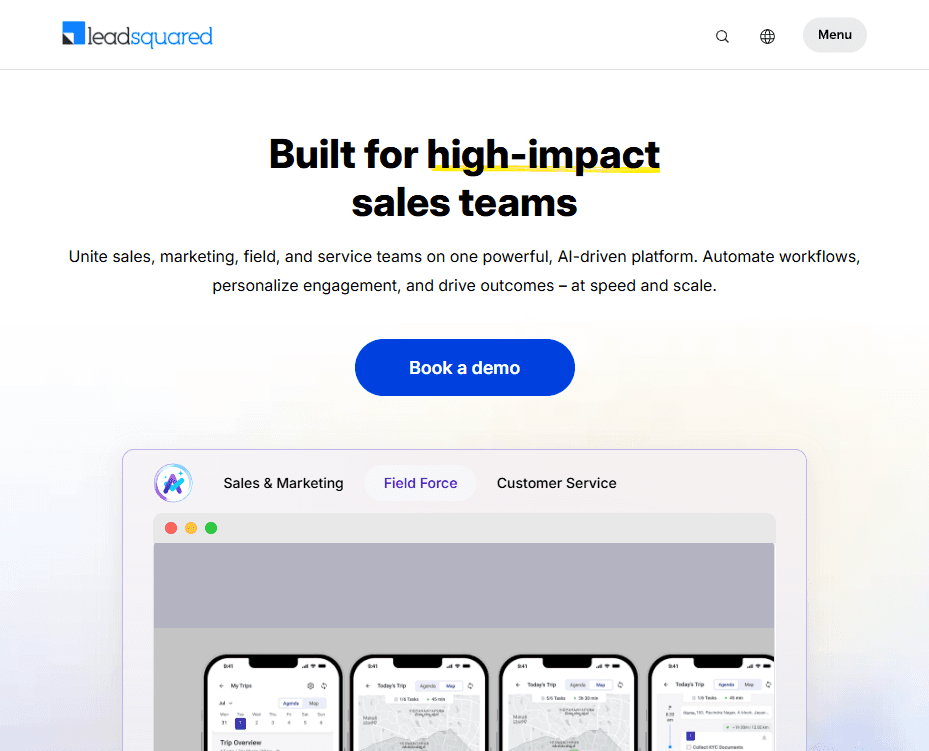
What it does: LeadSquared helps sales teams manage leads, automate tasks, and track activities across email, SMS, and calls.
Who it’s for: LeadSquared is built for inside sales teams that handle high lead volumes and need automated workflows, reminders, and follow-ups to keep deals moving efficiently.
LeadSquared is a revenue acceleration company that builds tools for sales execution, marketing automation, and lead management.
Founded to help fast-growing businesses improve conversion efficiency, it enables teams to capture, nurture, and close leads faster through automated workflows and integrated communication channels.
Pros
Automates lead capture, distribution, and follow-ups
Tracks calls, emails, and activities across multiple channels
Offers mobile CRM for field and remote teams
Cons
Interface can feel busy for new users
Advanced setup may require admin support
Pricing increases with added automation features
Pricing
Sales Pro costs $40 per user per month, while Sales Super costs $60 per user per month. Both plans require contacting the sales team for details.
More inside sales tools to consider
Here are 10 additional software programs for inside sales we thought you might like to consider. Each one brings something useful to the table.
11. Gong
Gong uses AI to capture every call, email, and meeting automatically. It turns that data into clear insights so your team always knows what’s working and what’s not.
You can onboard faster, coach smarter, and manage the pipeline with confidence. All without extra admin work.
12. Nooks
Nooks is an AI-powered dialer built for remote sales teams. It calls several numbers at once and skips voicemails and bad lines automatically.
Your team can share a virtual sales floor, listen in live, help each other in real time, and celebrate wins together. It brings the energy of in-person selling to remote work.
13. Orum
Orum uses AI to make every dialing session smarter. It handles phone trees, voicemails, and bad numbers so reps reach more live conversations faster. With built-in coaching, call insights, and a virtual sales floor, teams can connect, learn, and sell more efficiently.
14. Lavender
Lavender is your AI email coach that helps you write better, faster, and more personal sales emails. It scores your message, suggests instant fixes, and pulls in prospect insights right inside your inbox to boost replies and book more meetings.
15. Chili Piper
Chili Piper helps teams convert leads faster by automating scheduling, routing, and handoffs. Prospects can book meetings in one click from emails or chat, while qualified leads are instantly routed to the right rep.
16. Calendly
Calendly makes scheduling simple by letting prospects book meetings directly on your calendar. It connects with Google, Microsoft, and iCloud, automates reminders, and helps you qualify leads before they book.
17. LinkedIn Sales Navigator
Sales Navigator helps you find and connect with the right decision-makers on LinkedIn. Use advanced filters, InMail, and real-time alerts to reach prospects when they’re most engaged.
18. Salesken
Salesken gives reps real-time coaching during live calls. Its AI analyzes tone and keywords to help managers guide conversations and boost performance instantly.
19. Klenty
Klenty is a sales engagement platform that helps you find prospects and reach them through email, phone, WhatsApp, and SMS. It automates follow-ups, personalizes outreach with AI, and lets you manage multichannel sequences from one place.
20. Pipedrive
Pipedrive is a simple, visual CRM that helps teams manage deals with easy drag-and-drop pipelines. Starting at $14 per user per month, it offers email integration, reminders, and customizable workflows. It’s perfect for small to mid-size teams that want a clean, affordable CRM.
How we evaluated these inside sales software options
When we reviewed these tools, we focused on what really matters: helping sales teams sell more efficiently. Our goal was to find platforms that don’t just track activity but actually improve performance.
Here’s what we considered when reviewing inside sales tracking software:
Rep productivity: We wanted to see if the software helps reps have more real conversations and spend less time on admin work. The goal was more selling, less clicking.
Coaching and enablement: We looked for platforms that help managers identify where reps struggle and give specific, actionable feedback.
Call center integration: We checked whether tools connect smoothly with systems like Five9 or Genesys, without endless setup steps.
Real-time insights: We prioritized tools that guide reps during calls, not just after.
Our key questions
As we tested the software for inside sales, we asked three questions:
Does it help average reps perform like top reps? Tools that make success repeatable scored the highest.
How fast can new reps ramp up? We measured how well each platform supports onboarding and shortens the time to productivity.
What’s the real ROI? We looked for measurable results. Higher close rates, faster deal cycles, and more consistent quota attainment.
Other factors that mattered
We also considered how quickly inside sales tracking software can be set up, how much information technology (IT) support it needs, and how easy it is for reps to adopt. If a tool isn’t intuitive, reps won’t use it, and adoption is everything.
Finding the right inside sales software for your team
The best inside sales software depends on what your team values most. Some platforms focus on automation and outreach, while others emphasize coaching, reporting, or data enrichment. Start by looking at your sales motion. Look at how your team sells, what slows them down, and where consistency breaks.
If you run a smaller team, focus on ease of use and quick setup. Larger teams should prioritize integration, scalability, and compliance. The right tool should fit naturally into your workflow, not force new habits.
If your team spends most of its time on calls and needs consistent coaching, Alpharun is a solid choice. It learns from your best calls, builds a tailored playbook, and helps reps improve in real time while keeping data secure and compliant.
Alpharun scales the habits of top performers
What your best reps do naturally, Alpharun turns into a repeatable system. It uses your inside sales software to analyze results. It turns winning behaviors into repeatable systems. Also, it coaches reps in real time. This helps them sell smarter and close faster.
Scale top performance across your entire team. Start with Alpharun.
Frequently asked questions
How is inside sales software different from CRM?
Inside sales software automates outreach, coaching, and workflows, while CRM software stores customer data and tracks relationships. CRMs like Salesforce manage information. Inside sales tools like Alpharun actively coach reps and improve performance.
What features are most important in inside sales tools?
The most important features in inside sales tools are real-time coaching, call recording and analysis, automated workflows, CRM integration, and performance analytics.
Teams in regulated industries also need compliance monitoring and secure data handling. That’s why we recommend that you invest in call-center quality monitoring software.
What are the common pain points that inside sales software solves?
Inside sales software solves time wasted on manual tasks, inconsistent rep performance, poor data quality, lack of visibility into calls, and slow rep ramp time. It automates repetitive work so reps spend more time selling.
Which inside sales software is best for small teams?
The best inside sales software for small teams is Close at $49/user/month because it combines CRM, dialing, and communication tools in one simple interface. Apollo.io offers a strong free plan with solid prospecting data for teams just starting out.
How can inside sales software improve lead conversion rates?
Inside sales software improves lead conversion rates by coaching reps on proven winning behaviors, automating timely follow-ups, prioritizing high-intent leads, and ensuring consistent messaging. Real-time guidance helps reps handle objections better and close more deals.
How much does inside sales software typically cost?
Inside sales software typically costs $25 to $150 per user per month for standard platforms. Enterprise and AI-powered coaching platforms have higher, custom-priced plans.

